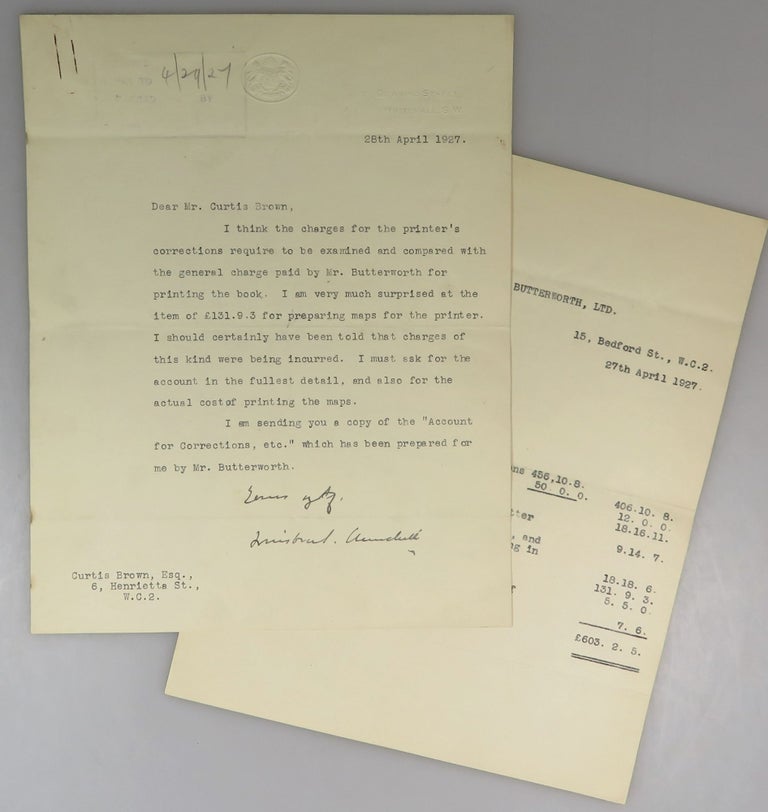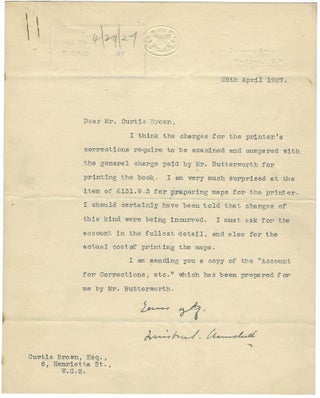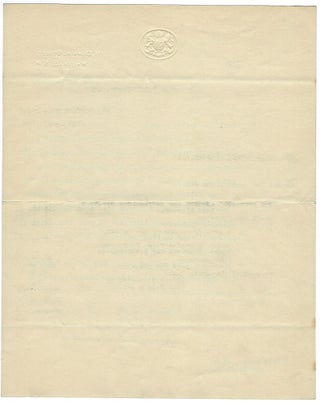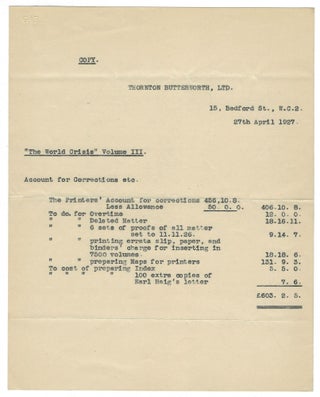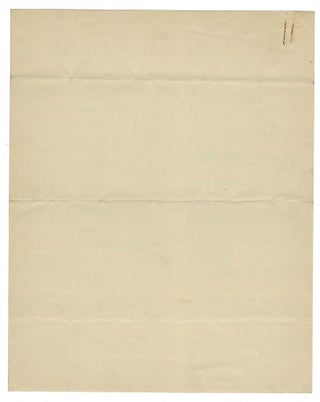28 April 1927 Typed Signed Letter from Winston S. Churchill on Chancellor of the Exchequer stationery to literary agent Curtis Brown (whose firm continues to represent the Churchill family to this day) regarding costs associated with printing The World Crisis
11 Downing Street, London: 1927. Letter. This 28 April 1927 typed, signed letter from then-Chancellor of the Exchequer Winston S. Churchill to literary agent Curtis Brown questions printing costs for Volume III of The World Crisis. The letter is intriguing for documenting early relations with Brown, whose firm continues to represent the Churchill family, for demonstrating Churchill’s ongoing drive to expunge the lingering taint of his role in the First World War, and for showing Churchill’s full engagement in his literary endeavors even while consumed with his Cabinet duties.
The letter is typed on a single sheet of embossed “11 Downing Street, Whitehall. S. W.” Exchequer stationery with Curtis Brown’s date stamp receipt hand-dated “4/29/27” at the upper left corner. Churchill asks for an examination of “the charges for the printer’s corrections” and expresses specific surprise “at the item of £131.9.3 for preparing maps for the printer.” He states “I must ask for the account in the fullest detail, and also for the actual cost of printing the maps.” and concludes “I am sending you a copy of the “Account for Corrections, etc.” which has been prepared for me by Mr. Butterworth.” The letter concludes with Churchill’s holograph valedictory and signature “Yours vy trly, Winston S. Churchill”.
The referenced “Account of Corrections, etc.” accompanies the letter, with a paperclip stain at the upper left corner matching a companion stain on the letter. The accounts statement is dated “27th April 1927” and specifically references “The World Crisis Volume III.” The itemized list of £603.2.5 includes the sum of £131.9.3 for “preparing maps for printers” questioned by Churchill. Other detailed charges include “Overtime”, deleted matter, errata slip printing and insertion “in 7500 volumes”, Index preparation, and “extra copies of Earl Haig’s letter”.
Condition of the letter and accompanying statement is very good. Both pages are complete, with no loss or tears, each showing three horizontal creases from original posting. Apart from the paperclip stains, the letter and accompanying itemized list of charges show only minor soiling and toning. The letter was formerly part of the legendary Churchill collection of Malcolm S. Forbes, Jr.
The important literary and talent agency founded in 1899 by American-born Albert Curtis Brown (1886-1945) still bears his name and still represents many Churchill family intellectual property assets, also working closely with the Sir Winston Churchill Archive Trust. The World Crisis is Winston Churchill's epic history of the First World War, in which he nearly lost both his political career and his corporeal life. First Lord of the Admiralty from 1911 until 1915, after the Dardanelles disaster, Churchill was scapegoated and forced to resign. He spent political exile as a lieutenant colonel leading a battalion in the trenches. Before war's end, Churchill was exonerated and rejoined the Government, but the stigma lingered, providing more than just a literary compulsion to write his history, published in six books between 1923 and 1931. Part III (published 3 March 1927) covers 1916-1918, including Churchill's time at the Front and subsequent return to the Cabinet.
It was for The World Crisis that Churchill first engaged Brown in the 1920s, driving a hard bargain; Brown would earn his 10 per cent commission only if royalties exceeded £15,000. (No More Champagne: Churchill and His Money, 126-127) When Churchill wrote this letter, he had introduced his third Budget in the House of Commons just a few weeks prior and addressed the House of Commons about the Budget on both the 26th and 28th of April. It is interesting that Churchill impressed his concerns about his publisher’s charges on his Chancellor of the Exchequer stationery. Despite the fact that “there were few writers of importance who were not Curtis Brown clients at some point in their careers” (ODNB) only one Brown client controlled the budget of the British Empire. Item #004576
Price: $4,500.00

